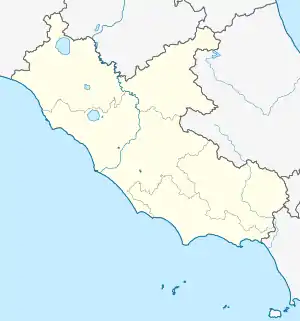Sabaudia | |
|---|---|
| Città di Sabaudia | |
 Sabaudia Town Hall | |
 Coat of arms | |
Location of Sabaudia | |
 Sabaudia Location of Sabaudia in Italy  Sabaudia Sabaudia (Lazio) | |
| Coordinates: 41°18′N 13°01′E / 41.300°N 13.017°E | |
| Country | Italy |
| Region | Lazio |
| Province | Latina (LT) |
| Frazioni | Baia d'Argento, Bella Farnia, Borgo San Donato, Borgo Vodice, Cerasella, Mezzomonte, Molella, Sacramento, Sant'Andrea, Sant'Isidoro |
| Government | |
| • Mayor | Alberto Mosca (Civic list) |
| Area | |
| • Total | 144 km2 (56 sq mi) |
| Elevation | 17 m (56 ft) |
| Population (31 July 2017)[2] | |
| • Total | 20,613 |
| • Density | 140/km2 (370/sq mi) |
| Demonym | Sabaudiani |
| Time zone | UTC+1 (CET) |
| • Summer (DST) | UTC+2 (CEST) |
| Postal code | 04016 |
| Dialing code | 0773 |
| ISTAT code | 059024 |
| Patron saint | SS. Annunziata |
| Saint day | March 25 |
| Website | www |
Sabaudia is a coastal town in the province of Latina, Lazio, in central Italy. Sabaudia's centre is characterised by several examples of Fascist architecture. Villa Volpi, a neoclassical seaside villa built for Countess Nathalie Volpi of Misurata, is located on the sand dunes of Sabaudia.
History
In ancient Roman times, the extensive Villa of Domitian was built nearby and embellished by the emperor.[3] Some of its remains have been excavated.
It is one of several towns built on the reclaimed marshland of the ancient Pontine Marshes (Agro Pontino). This marsh was drained under orders from Benito Mussolini. Vast tracts of malaria-infested swamp were drained by workers transported from poor areas of northern Italy, leaving the coastal area south of Rome with rich farmland. These towns were built so that the fascist regime could demonstrate the draining of the marshland, as well as to provide housing communities for the increasing urban populations of Italy's large cities.
Architects Gino Cancellotti, Eugenio Montuori, Luigi Piccinato, and Alfredo Scalpelli were responsible for the town plan and many of the buildings after winning a competition for the design of Sabaudia, sponsored by Mussolini. Work commenced on the town's construction on 5 August 1933 and was completed 253 days later. The city itself is based on a rectangular grid road layout and rationalist architecture. It was named after the then-reigning Savoy dynasty (Italian: dinastia sabauda).
Beaches
Sabaudia is well frequented by residents of Rome and Naples, as it is about halfway between the two cities. Sabaudia has 15 km of beach that were awarded the Blue Flag designation by the Foundation for Environmental Education (FEE). The FEE grades a beach based on the quality of water, recycling and waste management practices, the presence of lifeguards, and inclusion of pedestrian paths and green areas. Surrounded by the Circeo Forest, access is provided by a boardwalk along the entire coast.[4]
Twin towns / sister cities
 Saint-Médard-en-Jalles, France
Saint-Médard-en-Jalles, France El Vendrell, Spain
El Vendrell, Spain
References
- ↑ "Superficie di Comuni Province e Regioni italiane al 9 ottobre 2011". Italian National Institute of Statistics. Retrieved 16 March 2019.
- ↑ "Popolazione Residente al 1° Gennaio 2018". Italian National Institute of Statistics. Retrieved 16 March 2019.
- ↑ "The Domitian Villa: An Imperial Residence in Sabaudia, Italy". whitelevy.fas.harvard.edu. Retrieved 26 November 2022.
- ↑ Beaches of Rome
Sources
- Burdett, Richard (1982). Sabaudia: città nuova fascista. London: Architectural Association.
- Muratore, Giorgio; Daniela Carfagna; Mario Tieghi (1999). Sabaudia, 1934: il sogno di una città nuova e l'architettura razionalista. Sabaudia: A. Boschi.
- The Beaches of Rome: Ultimate Guide dolcevespa.com. Retrieved 2019-07-08
External links